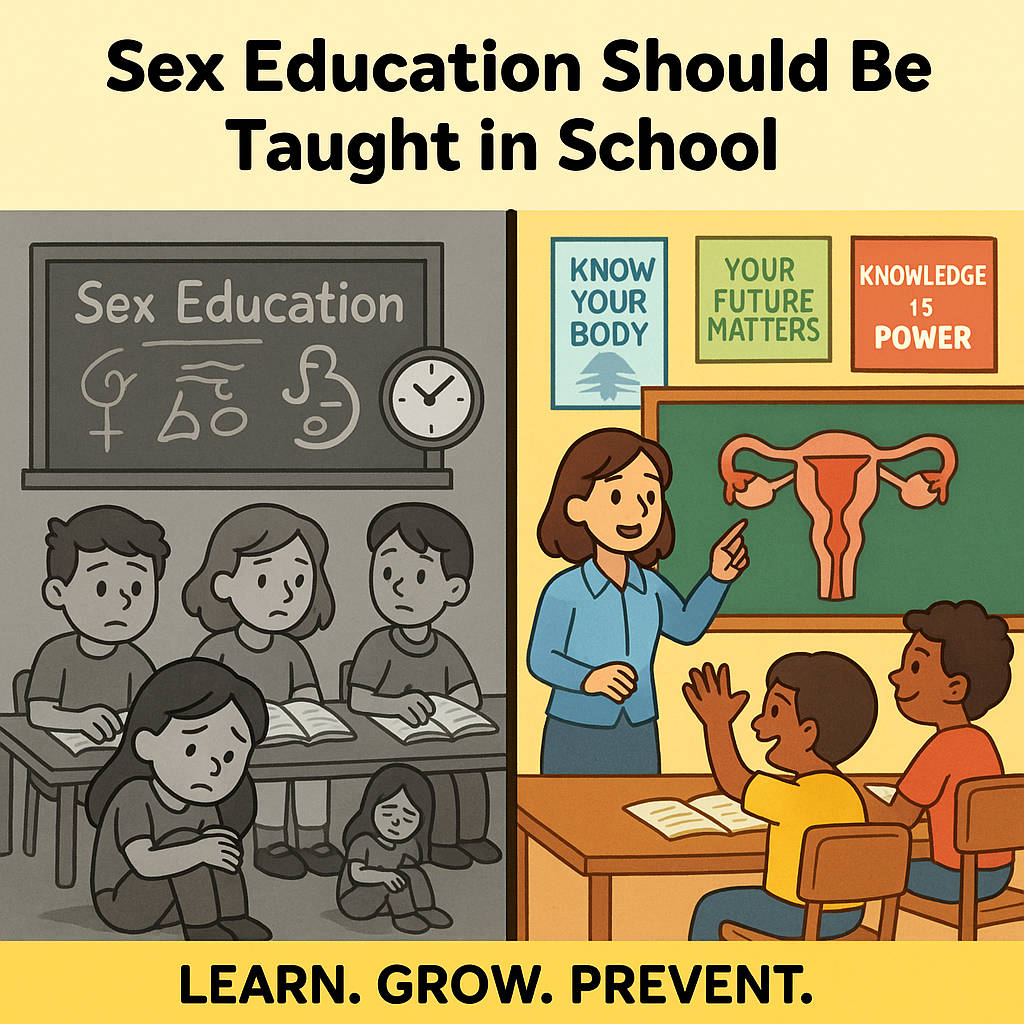Written by Alice Njoki.
Despite being included in the school curriculum, sex education is often not taught actively or taken seriously. In many schools, it is either skipped altogether or addressed vaguely, leaving students with little to no practical understanding of their sexual and reproductive health. This lack of seriousness means that, even though sex education is officially part of what students should learn, many young people still grow up uneducated about their bodies, sexuality, and how to protect themselves. As a result, the issues it is meant to address such as teenage pregnancy, school dropouts, and ignorance about safe sex remain widespread and unresolved.
And now thinking about teenage pregnancy in schools, it is clear that the lack of active and effective sex education has real consequences. No one talks openly about this issue, yet it leads to long-term effects such as poverty, school dropouts, and lack of knowledge about safe sex among teenagers. Teenage pregnancy, poverty, dropping out of school, and ignorance about sexual health are serious problems that affect many young people today. One major reason these issues persist is because parents rarely talk openly with their children both boys and girls about sex. Many parents feel ashamed or believe that discussing sex will corrupt their children’s minds. But this silence does not protect teens; instead, it leaves them confused, vulnerable, and often facing unintended pregnancies and difficult futures.
At home, parents rarely discuss these important issues. Many believe that talking about sex will corrupt their children, but this is not true. Instead, parents are often shocked when they have to deal with teenage pregnancies because of their wrong perceptions. From my own experience growing up and studying in a public school, I saw how the lack of sex education led many girls to make wrong choices. Most of these pregnancies happened around Form Two, a stage when many teenagers become sexually active but do not have the right information to protect themselves. Because of this, many girls dropped out of school, and only about 1% managed to return. This problem is even worse for children from poor families who depend on bursaries or government sponsorships to stay in school. When a girl gets pregnant, she often cannot afford to raise a child or continue her education. It becomes a case of a child raising another child, and the family’s poverty worsens. This cycle continues because the root cause-lack of knowledge and open communication-is never addressed. Instead of facing this problem honestly, many communities avoid talking about it, making the situation worse.
Teenage pregnancy is a major cause of school dropout and poverty. Many teenagers who become pregnant are not financially, physically and mentally ready to raise a child. Often, these young mothers are still children themselves, forced to take on adult responsibilities without support. Families already struggling financially are burdened further, and the cycle of poverty continues. Education is a proven way out of poverty, but when a young girl drops out due to pregnancy, her chances of breaking free diminish drastically.
Schools are the right place to provide young people with honest, age-appropriate sex education. Unlike at home, where parents may feel embarrassed or unprepared, schools can offer comprehensive lessons on puberty, contraception, healthy relationships, and the consequences of risky sexual behavior. Research shows that comprehensive sex education helps delay the age of first sexual activity, increases contraceptive use, and reduces rates of teenage pregnancy and sexually transmitted infections.
Sex education also helps teenagers understand the changes they go through during adolescence and equips them with skills to make responsible decisions. For example, studies show that most teenage pregnancies happen around the second year of secondary school, when many students become sexually active without proper knowledge.
The stigma around discussing sex must end. Instead of complicating the issue or pretending it does not exist, communities should embrace sex education as a tool for long-term solutions. Schools can create a safe environment where students feel comfortable asking questions and getting guidance from trained educators. Parents should also be encouraged to engage with schools to understand the curriculum and support their children.
Sex education is not about promoting sex, it is about empowering young people with knowledge to protect themselves and plan for a better future. It fosters respect, self-esteem, and healthy relationships, which are essential for their overall well-being.
Including sex education in school curricula is an important step toward solving problems like teenage pregnancy, poverty, and school dropouts. It fills the gap left by parents who, due to cultural taboos or discomfort, do not discuss these important issues at home. By educating young people early and comprehensively, we give them the tools to make informed choices, protect their health, and pursue their education and dreams. If we want to break the cycle of poverty and build a healthier society, sex education in schools is not optional-it is essential.

